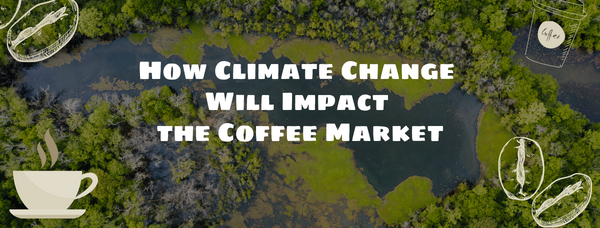How Climate Change Will Impact the Coffee Market
Climate change is making coffee production more difficult than ever before. Climate change may limit the availability of coffee in some cities and towns. It may also cause the price of coffee – to increase.
A clear understanding of the ramifications of climate change on coffee is key. Coffee producers who understand the impact of climate change can plan accordingly. Most importantly, these businesses can gather information and insights they can use to limit the impact of climate change on their operations.

What Climate Change Means for Coffee Producers
There is no denying that climate change affects coffee. Climate change is causing global temperatures to rise. To understand how, consider the impact of global warming in Ethiopia to date.
Some experts have estimated that Ethiopia’s coffee production area could be cut by nearly 60% by the end of the century, 2100. This is due in part to a projected four degrees Celsius increase in temperature. As global warming causes the temperature in Ethiopia to rise, it will stifle coffee production throughout the country. Meanwhile, global warming may cause similar problems for coffee producers in Latin America.
Climate change is causing long periods of rain and drought in Latin America and other areas of the world. To produce coffee, certain light, temperature, and humidity levels must be met. Yet, climate change is impacting these levels. It may even cause temperatures that reduce the area suitable for growing coffee by up to 50% by 2050.
The changing climate may contribute to pest problems in Latin America, as well. Disruptions in the pest population in areas where coffee is produced can have far-flung effects. These disruptions can impact the production of coffee and other foods. This may ultimately make it tougher for coffee producers to get the best results out of their crops.
While coffee plants are self-pollinating, pests can still damage crops by eating them or calling them home — and farmers may need to use increased pesticides, affecting plant quality. Further, infrastructure and materials may be damaged by the increase in the pest population.
How To Protect Against Climate Change
Climate change appears unstoppable, but there are many things that coffee producers can do to minimize its impact. These include:
1. Prioritize Smart Farming
Smart farming involves the use of information and communication technologies for agriculture. It allows a coffee producer to leverage a wide range of internet of things (IoT) devices to track their crops. These devices ensure a coffee producer can keep a close eye on their crops around the clock. They allow a coffee producer to identify any climate change warning signs and take instant steps to address them.
To get started with smart farming, a coffee producer must establish an infrastructure. It is paramount to consider what IoT technologies to use and how they will be implemented. Also, a coffee producer must make a plan to utilize these technologies and ensure they deliver the desired results.
Smart farming technologies let coffee producers monitor temperatures and other conditions that can impact their crops. Coffee producers can invest in these technologies and implement them right away. They can then leverage these technologies to understand their coffee crop conditions. If any climate change issues arise, these coffee producers will be able to find out about them immediately. At this point, they can take steps to address such issues and prevent them from recurring.
2. Invest in Disease-resistant Coffee
Disease-resistant coffee can be produced that may be nearly immune to global warming and other environmental changes. Developing this coffee requires research and development to determine which plants are nearly immune to devastating diseases. Fortunately, coffee producers in Nicaragua and other countries have shown the ability to create disease-resistant coffee. They have even been able to grow and harvest faster than they could with other types of coffee.
Research is ongoing into disease-resistant coffee and its benefits. A coffee producer can examine its current coffee crops and perform tests to determine their susceptibility to high temperatures and other climate changes. They can conduct regular analyses and modify their crop production techniques as needed. This can help a coffee producer establish disease-resistant coffee crops.
3. Be Proactive
Do not expect climate change to slow down any time soon. As such, coffee producers must learn about the issue and its impact on their businesses and others around the globe. Then, coffee producers can do their part to protect against climate change now and in the future.
Coffee producers can work in lockstep with government agencies and industry partners to develop and implement climate change initiatives. This allows coffee producers to take an active stance against climate change. At the same time, coffee producers can show businesses and consumers they are doing their part to address this worldwide issue.
Continue to look for ways to combat climate change. Stay up to date on news about climate change and its impact on the coffee sector and other industries. This empowers coffee producers with insights they can use to stay on top of climate change issues before they can impact their operations.
The Bottom Line on How Climate Change Will Impact Coffee
Climate change will impact coffee for many years to come. Coffee producers can take precautions to guard against climate change. This allows coffee producers to continue to provide quality products to consumers and businesses. In addition, these coffee producers can help the environment and stand out from their industry rivals.
Ainsley Lawrence
